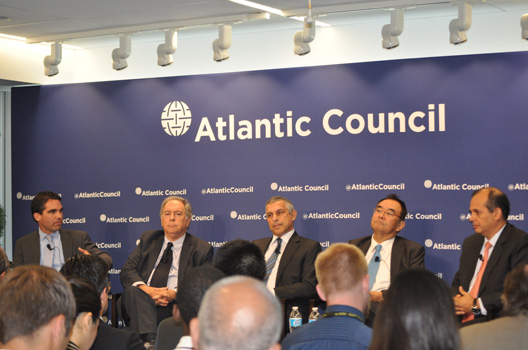 President Barack Obama announced in November 2009 the United States’ intention to participate in the Trans-Pacific Partnership (TPP) negotiations. The TPP came to include twelve countries, and to represent roughly 40 percent of the world’s GDP. On June 23, 2015 – just minutes before this event – the US Senate voted to end debate on Trade Promotion Authority (TPA), which was viewed as the first step of many toward advancing the TPP.
President Barack Obama announced in November 2009 the United States’ intention to participate in the Trans-Pacific Partnership (TPP) negotiations. The TPP came to include twelve countries, and to represent roughly 40 percent of the world’s GDP. On June 23, 2015 – just minutes before this event – the US Senate voted to end debate on Trade Promotion Authority (TPA), which was viewed as the first step of many toward advancing the TPP.
On June 23, the Atlantic Council’s Adrienne Arsht Latin America Center and Global Business and Economics Program hosted the event, Unlocking the Trans-Pacific Partnership: Views from Both Sides of the Pacific, with Latin American and Asian representatives from key countries in the TPP negotiations. Each shared their unique insight on the potential opportunities and pitfalls to be addressed with the TPP.
Jason Marczak, Deputy Director of the Adrienne Arsht Latin America Center, moderated the panel discussion with the Ambassador of Chile to the United States Juan Gabriel Valdés, the Ambassador of Peru to the United States Luis Miguel Castilla, the Ambassador of Singapore to the United States Ashok Kumar Mirpuri, and Kanji Yamanouchi, Minister for Economic Affairs at the Embassy of Japan.
Marczak started by asking the panelists about the TPA and its importance in the TPP negotiations. Ambassador Castilla suggested that the TPP negotiations have been stalled until the TPA is approved by the US Congress, but also reiterated that beyond the approval of TPA, there are other issues pending in the agenda. Ambassador Valdes asserted that it is practically impossible to make TPP countries agree without TPA, which leaves President Obama’s agenda in the Asia-Pacific in limbo. Valdes called for the United States to complement their current military and security strategy with economic and geopolitical engagement in the region, a concern echoed by Minister Yamanouchi.
On next steps for the TPP, Castilla stated there should be a discussion on intellectual property, which will be one of the most complicated debates. Castilla raised Peruvian concerns over pharmaceuticals, and Valdes echoed his remarks.
The Latin American ambassadors also pointed out the benefits that the TPP would bring to their countries, including expanded access to new markets in the Asia-Pacific region, new areas of trade such as services and investments, and the accumulation of rules of origin. Castilla also said that the TPP framework supports progress on other items on their agendas, such as accession to the Organization for Economic Co-operation and Development, governance, and transparency.
Marczak asked about the intersection between the Pacific Alliance (PA) and the TPP, given that Colombia, a PA member, is not an Asian-Pacific Economic Cooperation (APEC) or a TPP country. Valdes assured that the TPP will boost the Pacific Alliance, and Castilla, agreeing with his Chilean counterpart, added that the PA touches upon other topics of negotiation because member countries are heterogeneous. Castilla further suggested that it would be desirable for Colombia to join in the future.
On why the TPP is considered the framework of the twenty-first century, Ambassador Mirpuri said that it allows for new relationships to emerge in a wider trade region, which aligns with Singapore’s “trade as a life plan” premise. Minister Yamanouchi expressed it would be beneficial if more countries could join given the TPP’s high standards. His remarks were echoed by the rest of the panel. Marczak also pointed out China’s absence in the TPP. Valdes said that, despite the rumors, this is not an initiative to confront China, and that in fact it would be a more fruitful conversation if the latter could participate.
By the end of the discussion, the four panelists pointed out that all the countries have different agendas. This will make the negotiations tough, especially because the TPP will translate into a lot of legislative changes in each of the member countries. However, they are confident that the final agreement will succeed because, despite the secrecy of the negotiations, the political cycles, and the challenges they will face in their respective Congresses, there is wide domestic support in each of their countries for free trade agreements.
